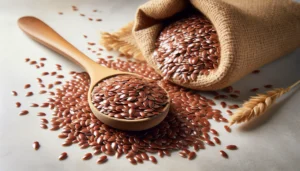Unlock the Benefits of Fiber
Despite its essential role in a healthy diet, dietary fiber often doesn’t receive the attention it deserves. According to the 2020-2025 Dietary Guidelines for Americans, adults should consume between 28-34 grams of fiber daily. However, an astounding 90-97% of Americans fall short of meeting these recommendations, missing out on the numerous health benefits fiber has to offer.
Fiber isn’t just another dietary component; it’s a crucial element that impacts weight management, disease prevention, digestive health, and more. This guide will explore the top reasons why increasing your intake of fiber can transform your health, offering compelling evidence and practical tips to help you harness the full benefits of fiber. Whether you’re looking to improve your gut health, reduce disease risks, or maintain a healthy weight, understanding and utilizing the power of fiber can lead you to a healthier, more vibrant life.
Fiber and Weight Management
Healthy Weight Loss
Increasing dietary fiber is a proven strategy for weight loss. The 2019 study published in The Journal of Nutrition offers in-depth insights into how fiber affects body weight. In this study, participants were assigned to four different diet groups, each with a calorie restriction but varying levels of fiber intake. Despite the differences in their diets, participants lost approximately the same amount of weight across all groups. This outcome supports the idea that fiber intake, rather than calorie count alone, plays a crucial role in weight management. Fiber contributes to a feeling of fullness, which can help reduce overall calorie intake by making people less likely to snack between meals or overeat.
Sustaining Weight Control
Long-term weight management is another area where fiber shows significant benefits. The 2023 study from Frontiers in Nutrition closely examined individuals who had lost weight and were in the process of maintaining their new lower weight. The study found that those who continued to consume high amounts of fiber were more successful in keeping the weight off compared to those who reduced their fiber intake. This suggests that fiber has benefits that extend beyond initial weight loss—it also helps in sustaining those results. High fiber foods help regulate appetite and body weight through their impact on digestion and satiety.
Fiber’s effects on weight control are thought to be linked to its ability to slow down digestion, which prolongs the sensation of fullness. Soluble fiber, for instance, forms a gel-like substance in the gut that slows the emptying of the stomach and reduces appetite. Insoluble fiber adds bulk to stool, which helps food move through the digestive system more quickly, aiding in regular bowel movements.
In addition, fiber has a low-energy density, which means it provides fewer calories relative to its volume. Including more fiber-rich foods in your diet can lead to a lower overall energy intake, without the need for restrictive dieting. This makes high-fiber foods an excellent choice for those looking to manage their weight without feeling hungry.
These studies underscore the importance of fiber in both losing weight and maintaining a healthy weight. By incorporating a variety of fiber-rich foods into your diet, you can enjoy these benefits while also enhancing your overall health.
Fiber’s Role in Disease Prevention
Reducing Type 2 Diabetes Risk
Dietary fiber has a notable role in reducing the risk of developing type 2 diabetes. A comprehensive 2020 study from the Journal of Diabetes Investigation discovered that individuals with higher overall fiber intake had a significantly lower risk of type 2 diabetes. The study highlighted that not just insoluble fiber, as previously thought, but a combination of soluble and insoluble fiber offers the greatest protective effects. Researchers believe that fiber helps manage blood glucose levels, supports a healthy gut microbiome, and reduces inflammation, all of which contribute to lowering diabetes risk.
A comprehensive 2020 study from the Journal of Diabetes Investigation discovered that individuals with higher overall fiber intake had a significantly lower risk of type 2 diabetes.
Lowering Heart Disease Odds
A high fiber diet is also linked to a decreased risk of cardiovascular disease (CVD). According to a 2022 study in BMC Public Health, individuals consuming more fiber had reduced odds of developing heart issues. Researchers theorize that soluble fiber helps reduce the absorption of cholesterol in the intestines, which lowers blood cholesterol levels. Furthermore, dietary fiber is known to decrease inflammation, a key risk factor for CVD, as noted in a 2022 article from JAMA Network Open.
According to a 2022 study in BMC Public Health, individuals consuming more fiber had reduced odds of developing heart issues.
Cancer Prevention
Fiber’s benefits extend to potentially reducing the risk of certain cancers. Studies, such as a 2020 review in The American Journal of Clinical Nutrition, have linked high fiber intake, especially from whole grains, to a reduced risk of colorectal cancer. Another review in the journal Cancer found that soluble and fruit fibers had strong associations with a decreased risk of breast cancer. These studies support dietary recommendations by the American Cancer Society, which advises a fiber-rich diet to help minimize cancer risk.
By incorporating more fiber into your diet, you not only benefit from its direct effects but also engage in a lifestyle that supports overall health and disease prevention.
Longer Life
In addition to reducing the risk of chronic diseases, fiber plays a significant role in increasing lifespan. A 2022 review in the Journal of Translational Medicine found that people who consumed adequate amounts of both soluble and insoluble fiber had a lower chance of premature death from any cause, including cardiovascular disease and cancer. This suggests that maintaining a high-fiber diet could offer protection even in the presence of these conditions, potentially enhancing longevity and improving overall health.
By incorporating more fiber into your diet, you not only benefit from its direct effects but also engage in a lifestyle that supports overall health and disease prevention.
A 2022 review in the Journal of Translational Medicine found that people who consumed adequate amounts of both soluble and insoluble fiber had a lower chance of premature death from any cause, including cardiovascular disease and cancer.
Fiber for Digestive Health
Promoting Regularity in Bowel Movements
Fiber is renowned for aiding regular bowel movements. Tanya Zuckerbrot, RD, highlights that constipation is a common issue in the United States. Fiber improves stool consistency, making it softer and bulkier. This change helps speed up its transit through the digestive system. A 2020 review in theJournal of the American Association of Nurse Practitioners found psyllium fiber to be particularly effective. It benefits those with chronic idiopathic constipation, which involves difficult, infrequent, or incomplete bowel movements. Additionally, a 2021 review in Clinical and Experimental Gastroenterology emphasizes the importance of water. Drinking plenty of water with a high-fiber diet enhances gut motility better than fiber alone. These insights demonstrate how crucial fiber is for maintaining digestive health and regularity.
Natural Detoxification
Fiber also plays a pivotal role in the body’s natural detox processes. According to Zuckerbrot, soluble fiber absorbs potentially harmful compounds, such as excess estrogen and unhealthy fats, before they can be absorbed by the body. This prevents these substances from causing health issues. Insoluble fiber helps speed up the transit of food and waste through the gut. This reduces the time toxins stay in the body, limiting their harmful effects. The quicker elimination of substances like BPA, mercury, and pesticides minimizes their impact and enhances overall health.
By actively supporting the natural cleansing processes and promoting regular bowel movements, fiber is a cornerstone of digestive health and overall well-being.
Additional Health Benefits of Fiber
Enhancing Gut Health
Fiber significantly benefits the gut microbiome. This is the community of beneficial bacteria in your digestive tract. These bacteria feed on the fiber we consume. They especially thrive on fibers that ferment in the gastrointestinal tract. A 2022 review in Animal Nutrition shows that as bacteria ferment fiber, they produce short-chain fatty acids. These acids are crucial for reducing systemic inflammation. This inflammation is linked to many chronic health issues. Kelly Swanson, Ph.D., notes rapid effects from increased fiber intake. Changes in gut bacteria can be seen in just a few days. However, consistent high fiber intake is necessary to sustain these benefits. Reducing fiber can negatively affect the microbiome and increase inflammation.

Stronger Bones
Certain soluble fibers, known as prebiotics, enhance bone density. These fibers increase the bioavailability of minerals like calcium in the colon. A 2018 review in Calcified Tissue International discusses this benefit. Prebiotics support mineral absorption which aids bone health. Good sources of these fibers include asparagus, bananas, onions, and legumes. These foods provide nutrients that feed beneficial gut bacteria and improve mineral absorption. Thus, fiber not only supports digestive health but also strengthens bones.
Flax Seeds: A Robust Source of Fiber
Flax seeds are an excellent addition to any diet, thanks to their rich content of both soluble and insoluble fiber. These small seeds offer a unique blend of fibers that benefit digestive health and beyond. Soluble fiber in flax seeds helps to slow digestion, stabilize blood sugar levels, and reduce cholesterol. Insoluble fiber contributes to regular bowel movements and helps prevent constipation. Flax seeds have also been proven to help with fat loss!
Beyond fiber, flax seeds are loaded with omega-3 fatty acids, lignans, and antioxidants, which provide additional health benefits. The omega-3 fatty acids in flax seeds are known for their anti-inflammatory properties, which can help reduce the risk of chronic diseases such as heart disease and arthritis. Lignans have both plant estrogen and antioxidant qualities, which may help reduce the risk of certain cancers and improve overall health.
Incorporating flax seeds into your diet is straightforward. They can be added to smoothies, baked goods, and yogurt, or sprinkled over salads and cereals. This subtle recommendation is not just about increasing fiber intake but also enhancing the nutrient density of your meals, making flax seeds a versatile and beneficial choice for health-conscious individuals.

Embracing a Fiber-Rich Diet
As we have explored, fiber offers an array of health benefits that extend far beyond basic digestive support. From aiding in weight management to reducing the risk of chronic diseases like diabetes and heart disease, and even potentially lowering cancer risks, fiber is a fundamental component of a healthy diet. Additionally, its role in enhancing gut health and strengthening bones underscores the wide-reaching impact of this essential nutrient.
By incorporating a variety of fiber sources, such as fruits, vegetables, nuts, seeds, legumes, and whole grains, you can ensure your body receives the spectrum of fibers it needs to function optimally. Remember, achieving the full benefits of fiber requires consistent intake, so integrating fiber-rich foods into your daily meals is key.
Start boosting your fiber intake today! Challenge yourself to meet or exceed the daily fiber recommendations. Make it a goal to try new fiber-rich recipes each week, and consider adding flax seeds to your diet for an extra fiber boost. Your body will thank you for the added health benefits, and you’ll likely notice improvements in your overall well-being. Let’s make fiber a priority in our diets and reap the benefits it has to offer.
A Note to Commercial Bakeries

- You can easily produce delicious high fiber, keto-friendly products which are clean label, high protein and plant-based!
- Recipes provided on all bulk orders, with ongoing customer support
- Worldwide shipping
- To order, visit our wholesale distributor, SnowCap Enterprises, and search: Powerflax Gold Low Carb Mix (SNC80).
- Get in touch with us!

